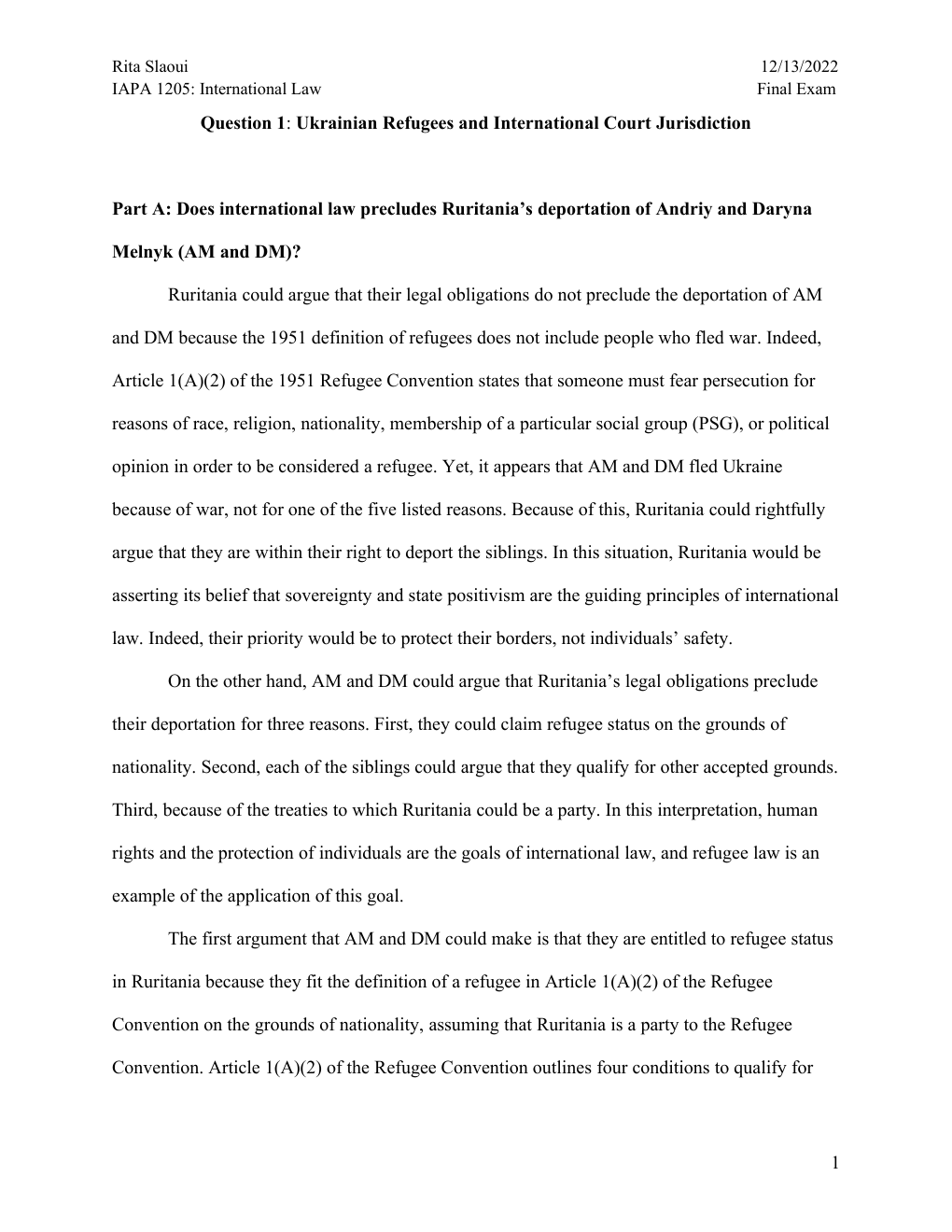Droit international Question 1: Ukrainian Refugees and International Court Jurisdiction
Publié le 19/05/2024
Extrait du document
«
IAPA 1205: International Law
12/13/2022
Final Exam
Question 1: Ukrainian Refugees and International Court Jurisdiction
Part A: Does international law precludes Ruritania’s deportation of Andriy and Daryna
Melnyk (AM and DM)?
Ruritania could argue that their legal obligations do not preclude the deportation of AM
and DM because the 1951 definition of refugees does not include people who fled war.
Indeed,
Article 1(A)(2) of the 1951 Refugee Convention states that someone must fear persecution for
reasons of race, religion, nationality, membership of a particular social group (PSG), or political
opinion in order to be considered a refugee.
Yet, it appears that AM and DM fled Ukraine
because of war, not for one of the five listed reasons.
Because of this, Ruritania could rightfully
argue that they are within their right to deport the siblings.
In this situation, Ruritania would be
asserting its belief that sovereignty and state positivism are the guiding principles of international
law.
Indeed, their priority would be to protect their borders, not individuals’ safety.
On the other hand, AM and DM could argue that Ruritania’s legal obligations preclude
their deportation for three reasons.
First, they could claim refugee status on the grounds of
nationality.
Second, each of the siblings could argue that they qualify for other accepted grounds.
Third, because of the treaties to which Ruritania could be a party.
In this interpretation, human
rights and the protection of individuals are the goals of international law, and refugee law is an
example of the application of this goal.
The first argument that AM and DM could make is that they are entitled to refugee status
in Ruritania because they fit the definition of a refugee in Article 1(A)(2) of the Refugee
Convention on the grounds of nationality, assuming that Ruritania is a party to the Refugee
Convention.
Article 1(A)(2) of the Refugee Convention outlines four conditions to qualify for
1
Rita Slaoui
IAPA 1205: International Law
12/13/2022
Final Exam
refugee status: (1) have a well-founded fear of being persecuted; (2) on the basis of race,
religion, nationality, membership of a PSG or political opinion; (3) to be outside the country of
their nationality; (4) to be unwilling or unable to avail themselves of the protection of that
country.
The siblings can easily prove criteria 3 and 4: they are in Ruritania so outside of their
country, and Ukraine is willing but unable to protect them from Russian persecution because of
the context of the war.
Additionally, they can argue that they have a well-founded fear of being
persecuted on the basis of their nationality because Russia claims that Ukraine does not exist,
and they thus risk denationalization.
Within this argument, AM and DM are entitled to refugee
status on the grounds of nationality, and Ruritania’s deportation is illegal because Article 33 of
the Refugee Convention prohibits the refoulement of a refugee.
However, the international community might reject this argument because it would
broaden the definition of a refugee beyond the initial intentions of the drafters of the Refugee
Convention.
By accepting this argument, the international community would effectively amend
the interpretation of the Refugee Convention to count as refugees anyone fleeing any war where
there is an invasion of one state by another with the goal of annexation.
Indeed, under Article
31(2)(b) of the Vienna Convention on the Law of Treaties, treaties should be interpreted in light
of “any subsequent practice in the application of the treaty.”1 Thus, if put into practice, this
argument would amend the interpretation of the Refugee Convention.
It would push international
law toward the protection of individuals at the expense of the state positivist vision that many
nations hold.
To counter this potential objection, AM and DM could argue that each one of them fits
the definition of a refugee under other grounds outlined by Article 1(A)(2) of the Refugee
Convention.
DM could make the argument that she is seeking asylum on the grounds of the
1 Vienna convention, 13
2
Rita Slaoui
IAPA 1205: International Law
12/13/2022
Final Exam
persecution that she would face because of her perceived political opinion, assuming that the
historical novels that she writes about Ukraine....
»
↓↓↓ APERÇU DU DOCUMENT ↓↓↓
Liens utiles
- François Bessire a écrit à propos de la rédaction du Traité sur la tolérance de Voltaire : Il faut au public visé par Voltaire, brièveté, variété, surprise, esprit, séduction des ornements, allure de la conversation. Il faut un livre qui pût se faire lire avec quelque plaisir : il faut être court et un peu salé sans quoi les ministres, madame de Pompadour, les commis et les femmes de chambre font les papillotes du livre (citation extraite de la correspondance de Voltaire). Les exigence
- American school system and inequalities
- Culture et littérature en question (1960 1989)
- François VILLON (1431-x) (Recueil : Poésies diverses) - Question au clerc du Guichet ou ballade de l'appel
- Mellin de SAINT-GELAIS (1487-1558) - Pour les masques de Monseigneur de Martigues à la Court

































